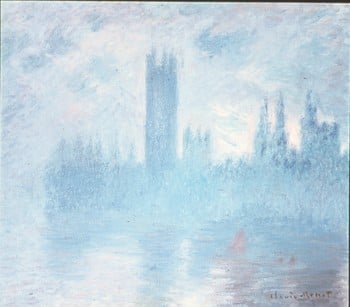The kingdom of God in literature and the arts

Literature and the arts intersect with the Kingdom of God all the time. Fantasy is a genre of literature that is perpetually touching on the Kingdom. Think about just a few titles where the main characters stumble into an alternate reality:
A Wrinkle in Time

Narnia
Alice in Wonderland
The Matrix
The Wizard of Oz
In the realm of art, impressionists soften the harsh light of reality and summon up echoes of the garden. Monet’s paintings, for example, remind me of C.S. Lewis’
Perelandra, a book depicting the Kingdom of God as it might originally have existed – a world where the fall of man never occurred. It’s a theme Milton first addressed in Paradise Lost. It’s a theme we as humans continually bump up against.
In the original zombie movie, “Night of the Living Dead,” zombies couldn’t be killed. They walked around unthinkingly, mindless inthe material world. As humans, we intersect with and touch the eternal all the time.
But too often, we dismiss such intersections as being coincidental – we look for some rational explanation. We’re like zombies as long as we live in this alternate reality and mistake it for the real thing.
We are not human beings having a temporary spiritual experience. We are spiritual beings having a temporary human experience. We need to wake up to reality.
We can look at any number of artists and writers and see a lot in an indirect way from the diffuse light they give off.
Comments (5)
Leave a Reply Cancel reply
More Posts
![]()



Seth, your reality check this week has been very important to me as I have been dealing with religous forces that in their heart of hearts see life as an earthly struggle with little, if any, Spiritual life or power between the day of salvation and the day we get to heaven. Thanks!!!!
I have always loved Pointilism (in art) and composers such as Debussy for this very reason. They direct us to the undirectable, and that is where the eternal is taking place. What we see, touch, and experience with our temporal senses is just there for us by God’s grace as an echo of the symphony of the eternal that is all around us.
you’re welcome, Keith. Of course, I struggle with this as much as anyone. For being such a visionary, I’m a hyper-rationalist.
I just finished rereading Peralandra and it is amazing thinking about what it must have been/could be like. And The Chronicles of Narnia played an amazing part of my eldest’s walk with Christshe has them on CD (the Focus on the Family Radio Theatre version) and spent a year listening and re-listening to them. Each morning as we did devotions she would draw a parallel between what we were reading in the Bible and what she had heard. The Lord used it to increase her comprehension in incredible ways.
As an artist I am only now learning to find the parallels between my personal walk with Christ and my artworkit is amazing how finding peace with myself and who He made me to be in Christ was what finally released me to paint freely, instead of being bound by what others thaought I should do.
Mmm yes – God has placed ‘eternity’ in the heart of men. http://www.13floor.net/flapsblog/?p=137
Also see comments on 4D faith http://www.13floor.net/flapsblog/?p=131